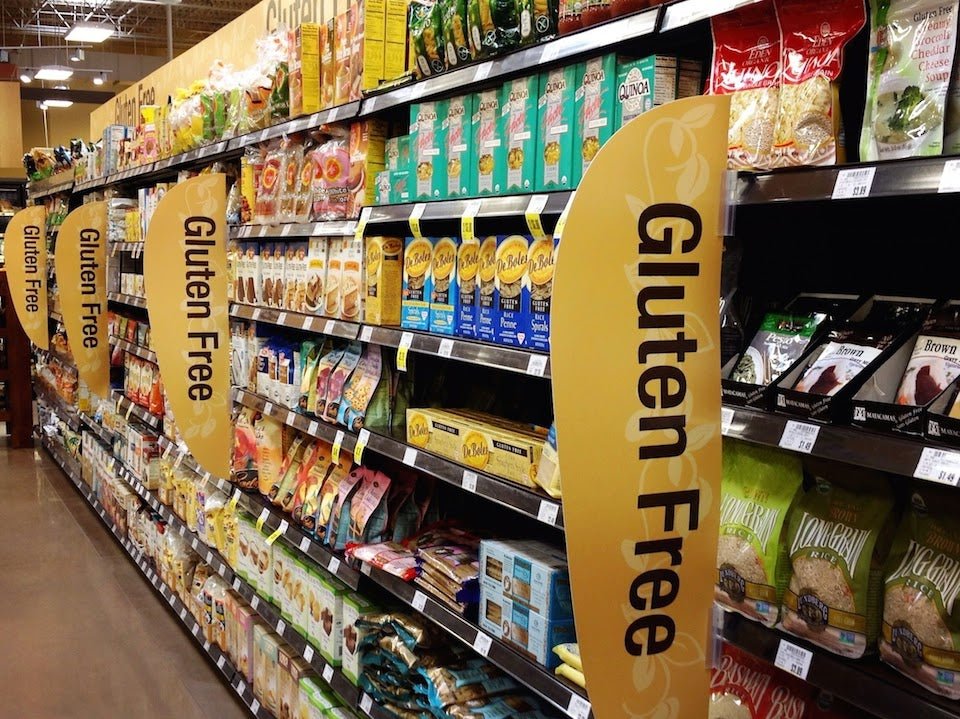Walking down the supermarket aisle, you may notice the wide array of products labeled as gluten-free: gluten-free bread, gluten-free cereals, gluten-free granola bars, etc.. A lot of buzz regarding gluten-free diet can be seen in magazines and on the internet. But, what exactly is a
Gluten free diet?
A gluten-free diet is a
diet that excludes
gluten, a
protein found in certain grains namely,
wheat,
barley,
rye. Gluten proteins are a low biological value protein. Gluten helps foods maintain their shape, acting as a glue that holds food together. The gluten-free diet is primarily used to treat celiac disease.
Celiac disease is the intestinal disease where the immune system acts against the gluten found in wheat,
barley,
rye. Gluten protein in patients with celiac disease causes inflammation in the small intestines. Eating a gluten-free diet helps people with celiac disease control their signs and symptoms and prevent complications.
Celiac disease if left untreated leads to
malabsorption, reduced quality of life,
iron deficiency,
osteoporosis and increased risk of intestinal
lymphomas. The “classic symptoms”, of celiac disease include chronic diarrhoea and abdominal distention.
The gluten free diet has now become part of a healthy lifestyle for many. Gluten-free diets along with a low carbohydrates meal, consuming more vegetables and fruit are thought to help people lose weight. Some people may be sensitive to gluten but don’t have the outright celiac disease. These people may feel better on a diet with less gluten. This diet is also used by many athletes who believe the diet can improve health and provide renewed energy.
Most people report feeling more energetic after going gluten-free. But take note: A food labelled as “gluten-free" isn't necessarily healthier. Gluten-free products can be high in calories, fat, and carbohydrates, and some people who go gluten-free actually gain weight. That said, as long as you continue to eat a balanced diet, cutting down on gluten probably won't cause any harm.
Eliminating gluten from your diet can be a very difficult and limiting task. Fortunately, there are many healthy and delicious foods that are naturally gluten-free. The most cost-effective and healthy way to follow the gluten-free diet is to seek out these naturally gluten-free food groups:
- Meat, fish, seafood,
-
Nuts, chia seed, flax
-
legumes, soy and beans
- Fruit and vegetables of all kinds
-
Pseudocereals like amaranth, buckwheat, quinoa, millets
- Certain cereal grains -corn, rice, sorghum
-
Arrowroot, sago, tapioca
- Dairy and dairy products
Many food items that usually contain gluten have gluten-free alternatives that are widely available in most stores like gluten-free oats, gluten-free bread and
gluten-free granola bars. This further simplifies living a gluten-free life.
However, the question remains do you need to go gluten-free? Grabbing a gluten-free granola bar instead of gluten granola bar has little benefit for you unless you have celiac disease or wheat allergy. By cutting down gluten from your diet you are reducing your intake of whole grains which is a key source of fiber in the diet.
Further eliminating an entire category of food from your diet leads to serious nutritional deficiencies especially B-complex vitamins,
calcium, iron, zinc,
magnesium, and fiber. At the same time eating a gluten-free diet requires care and constant attention to what you eat which can become difficult. There’s little point in taking risk of malnutrition and putting in so many efforts unless you g have celiac disease or gluten sensitivity.
For people who are on a gluten-free diet, the following guidelines will surely help you make better gluten-free choices.
-
Care to read: Many commercially available products are labeled “gluten-free”, but there will be some that are not this is why proper label reading is important.
-
Scoop the soup: Soups and sauces are one of the biggest sources of hidden gluten, as wheat is used by many companies as a thickener. Read the labels carefully especially in case of cream based soups.
-
Back on the beverages: Most beverages are gluten-free, including juices, sodas, and sports drinks and Alcoholic beverages like wines, hard liquor, distilled liquors. Beers, ales, malt beverages and malt vinegar that are made from gluten-containing grains contain gluten.
-
Go for the oats: Oats are often harvested and processed with the same equipment that is used for wheat and are therefore easily contaminated. Look for oats labelled gluten free in all products containing oats, including granolas and granola bars.
-
Gain on these grains: Whole grains that contain gluten are out, there are many naturally gluten-free grains that you can enjoy in a variety of creative ways. grains and other starch-containing foods are naturally gluten-free include rice, soy, sorghum, quinoa, millet.
Hope you liked the article. Feel free to leave any concerns/clarifications required in the comment box and we shall revert to you.



